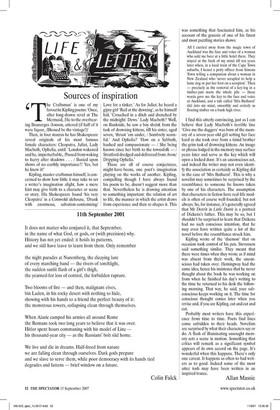Sources of inspiration
‘T he Craftsman' is one of my favourite Kipling poems: 'Once, after long-drawn revel at The Mermaid, /He to the overbearing Boanerges /Jonson, uttered (if half of it were liquor, /Blessed be the vintage!)' Then, in four stanzas he has Shakespeare reveal originals of his most famous female characters: Cleopatra, Juliet, Lady Macbeth, Ophelia, until: 'London wakened and he, imperturbable, /Passed from waking to hurry after shadows . . . / Busied upon shows of no earthly importance?/ Yes, but he knew it!'
Kipling, master-craftsman himself, is concerned to show how little it may take to set a writer's imagination alight, how a mere hint may give birth to a character or scene or story. His Shakespeare found 'his very Cleopatra' in a Cotswold alehouse, 'Drunk with enormous, salvation-contemning/ Love for a tinker.' As for Juliet, he heard a gipsy girl 'Rail at the dawning', as he himself hid, 'Crouched in a ditch and drenched by the midnight/ Dews.' Lady Macbeth? Well, on Bankside, he saw a boy shrink from the task of drowning kittens, till his sister, aged seven, 'thrust 'em under, / Sombrely scornful.' And Ophelia? 'How on a Sabbath, hushed and compassionate —I She being known since her birth to the townsfolk —I Stratford dredged and delivered from Avon/ Dripping Ophelia.'
These are all of course conjectures, might-have-beens, one poet's imagination playing on the works of another. Kipling, compelling though I have always found his poem to be, doesn't suggest more than that. Nevertheless he is drawing attention to something important: the relation of art to life, the manner in which the artist draws from experience and then re-shapes it. This was something that fascinated him, as his account of the genesis of one of his finest and most puzzling stories shows: All I carried away from the magic town of Auckland was the face and voice of a woman who sold me beer at a little hotel there. They stayed at the back of my mind till ten years later when, in a local train of the Cape Town suburbs, I heard a petty officer from Simons Town telling a companion about a woman in New Zealand who 'never scrupled to help a lame dog or put her foot on a scorpion'. Then — precisely as the removal of a key-log in a timber-jam starts the whole pile — these words gave me the key to the face and voice at Auckland, and a tale called 'Mrs Bathurst' slid into my mind, smoothly and orderly as floating timber on a bank-high river.
I find this utterly convincing, just as I can believe that Lady Macbeth's terrible line 'Give me the daggers' was born of the memory of a seven-year-old girl setting her face hard as she took over from a timid brother the grim task of drowning kittens. An image or phrase lodged in the memory may surface years later and serve as the key which will open a locked door. It's an unconscious act, and indeed the writer may not even identify the association as certainly as Kipling did in the case of 'Mrs Bathurst'. This is why a novelist may sometimes be surprised by the resemblance to someone he knows taken by one of his characters. The assumption that characters in fiction have real-life models is often of course well-founded, but not always. So, for instance, it's generally agreed that Mr Dorrit in Little Don-it is a portrait of Dickens's father. This may be so, but I shouldn't be surprised to learn that Dickens had no such conscious intention, that he may even have written quite a lot of the novel before the resemblance struck him Kipling wrote of the 'daemon' that on occasion took control of his pen. Stevenson said something similar. They meant that there were times when they wrote as if mind was absent from their work, the unconscious had taken over. Hemingway had the same idea; hence his insistence that he never thought about the book he was working on from when he finished his day's writing to the time he returned to his desk the following morning. That way, he said, your subconscious keeps working on it. The time for conscious thought comes later when you revise and, if you are Kipling, cut and cut and cut.
Probably most writers have this experi- ence from time to time. Poets find lines come unbidden to their heads. Novelists are surprised by what their characters say or do. A flash of illuminating unsought mem- ory sets a scene in motion. Something that critics will remark as a significant symbol appears of its own accord on the page. It's wonderful when this happens. There's only one caveat. It happens as often to bad writ- ers as to good. Indeed some of the most utter tosh may have been written in an inspired trance. Allan Massie

























































 Previous page
Previous page